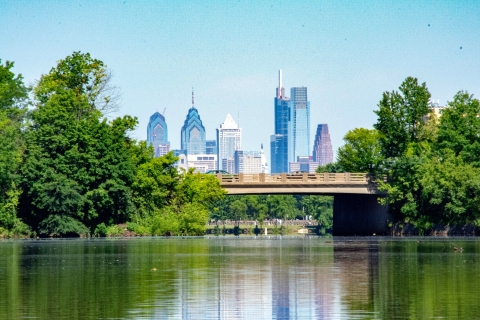Living in urban areas can create significant barriers to accessing nature, or what is perceived as nature. The truth is, we are not separate from nature — even urban landscapes are intertwined with wildness.
For Camden, New Jersey, residents, nature feels a lot closer to home thanks to a multi-organization partnership led by Upstream Alliance and fortified through a federal grant from the U.S. Fish and Wildlife Service’s Delaware Watershed Conservation Fund.
Community-supported and sustained
The Camden Water Trail has been a labor of love for partner organizations and residents.
At first, Upstream Alliance planned to hire eight employees locally to bring waterfront access as well as recreational and educational opportunities to the people of Camden — a city bordered by water on three sides. It turned out that partners underestimated community interest and participation, and therefore the number of people needed to support the programs. They ended up hiring 20 people, bringing jobs and training opportunities to residents, including local youths like Bella Morton.
During a presentation at her school, Upstream Alliance asked for volunteers to join them for an expedition down the Cooper River. Morton, with some uncertainty, applied and was accepted to participate. What she experienced was not only a surprise; it shaped how she connects with her community.
“Honestly, it was very shocking,” Morton said. “I knew I lived near the Cooper River, but I didn’t realize how far it stretched along New Jersey. At one point during the trip, we found water mills along the river, and I think that comes to show how much history has been hidden away . . . It wasn’t just us (the students) who were surprised by what we found; the rest of the community was shocked.”
Morton now works with Upstream Alliance, going from student to teacher.
The experience continues to shape her and how she perceives her own community. “I feel like I am becoming more aware of my surroundings, especially where I live. I am realizing how much there really is, and how much people take for granted. I really think this is changing me into someone who wants to encourage other people to do things like this,” Morton said.
Time for change
The Camden Water Trail includes an eight-mile stretch of the Cooper River, a tributary of the Delaware that flows through the city. The river is known for historically being polluted and unusable; even standing on its banks proved to be an unpleasant experience for the senses. The river smelled, had algae buildup and was so contaminated a person would not want to so much as stick a toe in it. Overwhelmed wastewater treatment plants dumped sewage into the river, repelling people and wildlife. Fish no longer migrated up the river to spawn, nearly wiping out its Atlantic sturgeon and American shad populations. It was time for a change.
In the 1990s, all sewage was directed to one treatment plant that could handle the load. Almost immediately, the river began to heal. However, the Cooper River still suffered the stigma of being unclean and unfit for enjoyment.
Connecting to nature
Upstream Alliance, with the help of partners, is reconnecting people to their river. Free programs teach users how to recreate on the water and ensure that the community understands the water is safe. The Camden Water Trail, which totals 13 miles long, includes multiple access points for kayaking and canoeing. Visitors can participate in guided paddling opportunities or develop the skills needed to enjoy the river on their own.
Phase one of the project ended in fall 2023. Partners opened more than 1000 acres of accessible waterway, restored a half-mile of shoreline, engaged with 2866 participants and 32 volunteers, created and hired for 20 jobs, and even counted fish at two sites.
In phase two, partners are continuing their education and outreach opportunities and enhancing trail access points with interpretive signage, including trailhead signs with maps and safety information, to make access safer and easier for the community.
All of these efforts are being made with the community — instilling a sense of pride and ownership in residents. Youth with knowledge of and access to nature and outdoor recreation have the opportunity to connect meaningfully with their neighborhoods. With this new trail and free programming, partners are seeing changes begin.
“Parents are trying to give their kids opportunities they just didn’t have,” said Don Baugh, founder of Upstream Alliance. “There are birds, fish, life, grass, trees — there’s far more than you need to provide the opportunities that will change their (kids and parents’) lives and change their community.”
Dollars where it counts
Grant programs like the Delaware River Conservation Fund are integral to this change.
"Without the support of the U.S. Fish and Wildlife Service, the opportunity to bring people to water and give them experiences that improve their quality of life, and therefore the quality of the community, would not have been realized. It wouldn’t have happened, at all,” Baugh said.
When we have access to — and see ourselves as part of — nature, our lives are enriched and connected in a powerful way. We appreciate that which we experience and understand. Outdoor recreation is a meaningful way to ensure that future generations take pride in being a part of something bigger than themselves.




